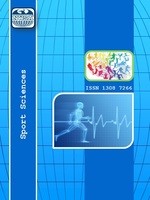TÜRKYYE HALTER ?AMPYYONASINDAKY HALTERCYLERYN ORTA VE UZUN DÖNEMDEKY SERBEST ZAMAN FAALYYETLERYNE KATILIM BYÇYMLERY
ÖZET Tarama modelinde yapylan bu ara?tyrmanyn amacy, Kulüpler Arasy Türkiye Halter ?ampiyonasy'na (KATH?) katylan sporcularyn orta ve uzun dönemdeki serbest zaman faaliyetlerine katylym biçimlerini de?erlendirmektir. Kasym 2008 tarihinde Mu?la'da yapylan KATH?'na 40 de?i?ik kulüpten 186 sporcusu katylmy?tyr. Toplanan verilerde frekans, yüzde da?ylym, ortalamalar ve "t testi" kullanylmy?tyr. Haltercilerin serbest zamanlaryny müzik dinleme, dinlenme, gezme, televizyon seyretme, spor müsabakalaryny izleme, arkada? ve akraba ziyaretine gitme ?eklinde de?erlendirdiklerini; fakat federasyonlaryndan ve kulüplerinden sa?lykly bir ?ekilde bilgi alamadyklary, kulüplerinin imkânlaryny yeterli bulmadyklary ve serbest zaman faaliyetlerine yeterince katylmadyklary, sebep olarak da en çok ekonomik yetersizli?i göstermektedirler. Katylym ?ekillerinin ise spor tesislerinde, evde, yurtta arkada? gruplaryyla beraber oldu?unu; faaliyetlerin kendilerinde dinlendirici, mutlu edici, zevk verici, rahatlatycy ve can sykyntysyndan uzakla?tyrycy etki byrakty?yny; genelde serbest zaman de?erlendirmelerini gelece?e yönelik olarak bilinçli ?ekilde de?il de, pasif olarak geçirdiklerini, bunun yanynda halter bran?yny severek, isteyerek yaptyklaryny belirtmi?lerdir. Haltercilerin uzun vadeli ba?arysynyn planlamasynda ya?am tarzy, dolayysyyla serbest zamanlaryn etkili ?ekilde de?erlendirilmesi önemli bir rol oynamaktadyr.
Anahtar Kelimeler:
SERBEST ZAMAN, HALTER, SPOR, SPOR KLÜPLERY, BEDEN E?YTYMY,
MEDIUM AND LONG TERM LEISURE ACTIVITY PARTICIPATION PATTERNS OF THE WEIGHT LIFTERS PARTICIPATING IN TURKISH WEIGHT LIFTING CHAMPIONSHIP
ABSTRACT Active participation of weight lifter in leisure activities helps them to adopt the living style that will lay the basis of their success and efficiency. Hence, the present study aims to investigate the short, medium and long-term leisure activity participation patterns of the male and female weight lifters participating in Turkish Inter-club Weight-lifting Championship. This research is a descriptive research in a search model. The participants of the study are 66 female and 120 male weight lifters (total=186) from 40 different sports clubs participating in Turkish Inter-club weight-lifting championship held in Mu?la in November 2008. For the analyses of the data, SPSS program package was used. Frequencies, percentages, t-test results are presented in tables and then they are interpreted. The results of the study revealed that athletes spend their medium and long-term leisure time in similar ways by listening to music, resting, walking around, watching, and watching athletic competition; moreover, weight lifting federation and clubs provide more leisure opportunities for male athletes. On the other hand, high-school graduate weight lifters are financially supported by their parents, they do not work in any job at weekends, they can not have much information about the opportunities for leisure activities from the federation and clubs, they do not read much about how to use leisure time, they do not find the opportunities provided by their clubs inadequate, they do not adequately participate in leisure activities, and they show financial problems as the reason for their inadequate participation, yet they do not have any difficulties to fill in their spare times. They also stated that they do not have enough time, the facilities and equipment are not satisfactory, and their participation usually takes place in a sports facility, house or dormitory; their participation in leisure activities help them to relax, feel happy, and eliminate the boredom. They do not participate in leisure activities consciously aiming some future benefits, their participation is usually passive and they usually prefer to be with their friends and finally they stated that they like weight lifting and they are participating in weight lifting-related activities willingly. In the planning of the long-term success of an athlete, his/her life style and effective use of leisure time is of great importance. Federations and clubs should not only carefully plan the training program of their weight lifter but also their leisure activities.
Keywords:
Leisure Time, Weight Lifting, Sports, Sports Clubs, Physical Education, ,
- Başlangıç: 2009
- Yayıncı: E-Journal of New World Sciences Academy
Sayıdaki Diğer Makaleler
SINIF Ö?RETMENLERYNYN BEDEN E?YTYMY DERSY TUTUM DAVRANI?LARI VE YETERLYKLERY
2023 YILI ELAZI? YLY SPOR TESYSLERY STRATEJYSY: MODEL ÖNERYSY
Bilal COBAN, Yunus Emre KARAKAYA
Dilek SEVİMLİ, Zeynep Filiz DİNÇ
BEDEN E?YTYMY Ö?RETMENLERYNYN ÖZYETERLYK ALGISI VE SOSYAL FYZYK KAYGI DÜZEYLERYNYN YNCELENMESY
Senay KOPARAN, Füsun Öztürk KUTER, Nimet Hasil KORKMAZ
Nevzat MIRZEOGLU, Aylin CELEN, Dilşad Ayşe MİRZEOĞLU
GÜRE?ÇYLERYN SÜREKLY KAYGI DÜZEYLERYNYN BAZI DE?Y?KENLER AÇISINDAN DE?ERLENDYRYLMESY
